
What is Accreditation and Why Does It Matter?
Accreditation further ensures that the school’s operations, curriculum, faculty, and student support systems are regularly reviewed and held accountable to high standards. This safeguards your child’s academic journey from elementary years through high school graduation, supporting smooth transitions if your student ever needs to transfer or apply to higher education.

Types of Accreditation: Regional vs. National
Online schools may hold either regional or national accreditation. Understanding school accreditation is essential when evaluating your options, as it affects credit transfers, college admissions, and overall educational quality. Regional accreditation, awarded by one of seven regional agencies in the United States, is generally more rigorous and is widely accepted for credit transfers and college admissions. Most public and prestigious private colleges expect diplomas and transcripts from regionally accredited institutions. National accreditation, often associated with career, religious, or alternative education programs, may be sufficient for some families but is not consistently recognized by other schools and universities.
Timelines for New Online Schools to Earn Accreditation
New virtual schools and programs must often operate for a set period—sometimes up to 2 or 3 years—before they are eligible to apply for accreditation. The process involves comprehensive self-assessment, documentation, and on-site (or virtual) reviews by accrediting teams. During this candidacy phase, schools may market themselves as “accreditation-seeking” but have not yet reached full status.
For families considering new or rapidly growing institutions, it’s essential to ask: How long has the school been in operation? What is the current accreditation status? When do they expect to receive full accreditation? Understanding these timelines helps set realistic expectations around credit transfer, recognition, and diploma acceptance.
Alternative Quality Factors for Online Education
While accreditation is key, it’s not the only indicator of a high-quality online school. Several practical factors can help families evaluate programs and safeguard their children’s educational experiences:
- Curriculum and Standards Alignment: Does the program match state or national education standards? Are there honors or Advanced Placement options?
- Teacher Credentials and Support: Are teachers certified and experienced in online instruction? What training and resources are in place?
- Student Services: Are there robust support systems for academic advising, mental health, special education, and extracurriculars?
- Technology & Learning Platforms: Is the technology reliable, accessible, and designed for student engagement?
- Graduation and College Outcomes: What are the graduation rates, college acceptance statistics, or student testimonials?
It’s worth noting that measuring school quality goes beyond surface metrics. As highlighted in Education Week, even well-intentioned indicators may not fully capture the nuances of student learning or program effectiveness, so a holistic, multi-faceted evaluation is essential.
Practical Evaluation Criteria and Questions for Parents
When evaluating schools, whether in-person or online, having a clear set of criteria can help you make an informed decision. Parents can benefit from a structured approach that balances academics, student support, and long-term outcomes. Educational concierge services can be invaluable here, offering personalized guidance on school selection, accreditation verification, and navigating enrollment processes.
Start by asking these essential questions during interviews or when reviewing school websites:
Accreditation and Oversight
- What agency accredits this school, and when was the last review?
- Accreditation is a key indicator of quality. A reputable educational concierge can help you interpret accreditation reports and ensure the school meets regional or national standards.
Credit Transfers and Transcript Transparency
- Does the school have a transparent process for credit transfers and transcript requests?
- This is crucial if your child may move schools or apply to colleges. Personalized support from an educational concierge can streamline requests and verify that transcripts will be recognized by other institutions.
Teacher Preparation for Remote Learning
- How are teachers trained for remote instruction and student support?
- Teachers skilled in virtual classrooms make a significant difference in student engagement and outcomes. Concierge services can provide insights into teacher credentials and ongoing professional development programs.
Academic and Counseling Supports
- What academic or counseling supports are available if my child struggles?
- Understanding support structures such as tutoring, mentoring, or counseling ensures your child has resources when challenges arise. A concierge can help you compare support offerings across schools.
Technology Access and Troubleshooting
- How does the school handle technology access and technical issues?
- Reliable devices and IT support are vital for online learning. Educational concierges can advise on schools with strong tech infrastructure and student accessibility programs.
Student Outcomes
- What are the school’s graduation, college entrance, or standardized test outcomes?
- Evaluating results helps gauge overall effectiveness. Concierge services often maintain performance data to help parents make informed comparisons.
Curriculum Transparency and Staff Access
- Can I see sample lesson plans or meet with current teachers and student advisors?
- Reviewing real classroom materials and speaking directly with staff gives a clearer picture of daily learning experiences. Concierge support can coordinate these meetings and provide additional context.
By following these practical evaluation criteria, parents can feel confident choosing a school that aligns with their child’s needs. Educational concierge services act as a knowledgeable partner, helping families navigate accreditation details, personalized supports, and enrollment logistics with ease.
Navigating Personalized Support and Expert Guidance
In a crowded field of K-12 online schools, families can benefit from one-on-one support with specialists who understand accreditation, curriculum variations, and student needs. Concierge-style services clarify complex application processes, accreditation timelines, and transcripts, ensuring every child’s education remains on track and recognized.
Educational concierge teams can also connect families with special needs resources, help plan for college or career pathways, and recommend additional enrichment activities that match a child’s interests and academic strengths. While many families can successfully navigate school research on their own, personalized support can streamline the process and add an extra layer of confidence to this critical decision.
Online School Quality Conclusion
Selecting an online school requires careful consideration of accreditation, alternative quality indicators, and personalized student support. By equipping yourself with the right questions, verifiable standards, and expert guidance, you can ensure your child receives a rigorous, well-recognized education that opens doors to future success. An informed and proactive approach will help your family make the best possible choice in the evolving world of virtual K-12 learning.






